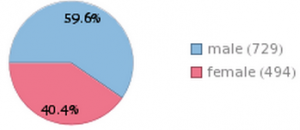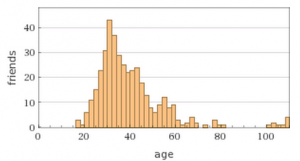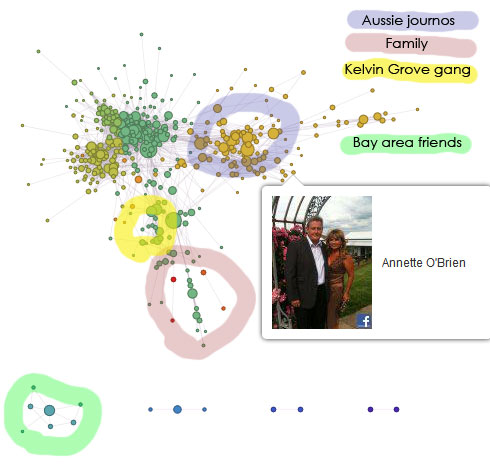
Profile analytics are finally here! WolframAlpha has introduced an engine that could make sense of your Facebook data and produce meaningful insights.
This time, it’s personal.
I plugged my Facebook account into the new engine and it gave me some fascinating information about y’all.
For example, I prefer to talk to blokes and 30-somethings.


Several months ago, it told me I posted more links than statuses. That has now changed, which is an interesting indicator of my changing habits.
It even highlights the status updates and pictures that have gleaned the most comments, as well as those friends most likely to comment and like my posts.
Its mapping algorithm is the really cool bit. Friends are depicted as a bubble map, with larger bubbles showing their influence on your friends list (ie: how many friends you have in common), and modeled to show your groups of friends.
Here, I’ve shown clusters that represent my family, Australian journalists I know, the “Kelvin Grove gang” (my nearest and dearest), and the new friends I’ve made since moving to the San Francisco Bay Area (who are understandably not connected to my Australian friends).
The way each group connects with each other is fascinating. For example, look at the linear way my family is connected (with few cross-connections because my non-immediate relations have no relationship to each other) compared with the journalists, who are pissing in each others’ pockets.
The nuts and bolts
It looks similar to insights on Facebook pages, which has been around for ages, but it is actually quite different. Once you give the app permission, it collects data from your basic information page, your activity log and your friends list – then it crawls your friends list for information about them.
Its power comes from the fact that it isn’t just accessing public information but all the information your friends allow you to see. In fact, you can collect data on your friends accounts as well (though you’ll only be able to see what they allow you to see).
How could it be used?
This data has applications for anyone using Facebook to build a personal brand – CEOs, marketing folks, consultants, and jobseekers like me. It shows me what posts are working, and among which groups of people.
For marketers, it is a goldmine of personal information. The detailed demographics information informs and guides marketers, and helps them evaluate the needs of their audience – and the friend snooping tool is particularly powerful.
Coupled with influence tools like Klout, I could imagine data mines like this would be vital to the future of digital marketing. Together, they can identify influencers, find out what makes them tick and target them with key messages.
Sometimes data is beautiful, no?
Thanks to Marketing Land for the heads-up.

